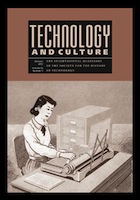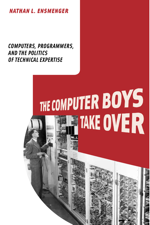Pioneers in Informatics
November 29, 2012 #media
Beginning on Monday (12/3/2012), Radio Österreich (Austrian public radio) will be running a series on gender and computer science. I was interviewed for the project, and so if you want to hear me summarize my research on the history of women in computer programming (overdubbed in German! Meine eigene Deutsch ist sehr schlecht…), tune into the series on Pioneers in Informatics.
The Digital Construction of Technology
November 06, 2012 #publications
The latest issue of Technology and Culture is out, and features an essay of mine entitled “The Digital Construction of Technology: Rethinking the History of Computers in Society,” in which, among other things, I posit the existence of a virtual Bruno Latour! The article is both an exploration of the existing historiography in the history of computing and a call for a renewed focus on the role of technology in changing work practices. The pretty, journal-format article can be found here and I believe is, for the moment at least, open access. If not, you can find an online edition outside the firewall
From Mechanical Brains to Philosophical Zombies
October 11, 2012 #research

From Descartes and Leibniz to Dennet and Searle, philosophers of the mind have struggled to understand the relationship between the mind and body. How did purely material structures and processes (the body) lead to second-order phenomenon such as self-consciousness (the mind)? Such seemingly metaphysical questions acquired new significance in the era of the electronic digital computer, when the possibility of creating “artificial” intelligence suddenly became a real possibility. In this paper, I explore the history of thought experiments in cognitive science and artificial intelligence, from the industrial thought mills of Gottfried Leibniz to the Turing Test of Alan Turing through the “Swampman” of Donald Davidson to the gedankenexperiment du jour, the “Philosophical Zombie.” In many respects, this is a continuation of the research on chess as an experimental technology in AI that I published earlier recently in Social Studies of Science.
Update: Just in time for Halloween, here is the zombies talk that I delivered this past week in Copenhagen at the Society for the History of Technology conference. The slides are here.
Rob Kling Center for Social Informatics
October 05, 2012 #media
On Friday, October 19, I will be giving a lecture at the Rob Kling Center for Social Informatics on my work on gender and computing. The title of the talk is “From Cosmo Girls to Computer Boys: A Gendered History of the Computer Revolution”. The presentation formally runs from 2-3:30 (Wells Library - LI030) but there will be an informal gathering (with food!) starting at 1:45.
I400/I590 - Information Systems and Organizational Change
September 28, 2012 #teaching
In the spring 2012 semester I will be introducing a new course that explores the relationship between information technology and organizational change. Here is a brief course description. More information and a syllabus to follow:
The design and construction of technology is only the beginning of the challenging process of implementing (and maintaining) complex information systems. In this course, we will explore the technical, sociological, ethnographic, and historical literature that deals with the organizational aspects of information technology. The focus will be on business information systems, but we will also look at scientific, governmental, and health-related organizations as well.
The Computer Boys is out in paperback!
August 08, 2012 #publications
The latest edition of The Computer Boys Take Over is out, this time in paperback. You can also buy the Kindle Edition or the original hardcover.
From the updated book jacket:
This is a book about the computer revolution of the mid-twentieth century and the people who made it possible. Unlike most histories of computing, it is not a book about machines, inventors, or entrepreneurs. Instead, it tells the story of the vast but largely anonymous legions of computer specialists–programmers, systems analysts, and other software developers–who transformed the electronic computer from a scientific curiosity into the defining technology of the modern era. As the systems that they built became increasingly powerful and ubiquitous, these specialists became the focus of a series of critiques of the social and organizational impact of electronic computing. To many of their contemporaries, it seemed the “computer boys” were taking over, not just in the corporate setting, but also in government, politics, and society in general.
Learn more about the book at thecomputerboys.com.


